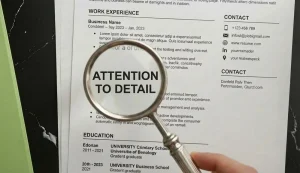When an interviewer asks, “What can you bring to the company?”, they’re not just making small talk. They’re giving you a chance to prove why you’re the best choice for the role. This is your moment to show that you understand the company’s needs, that you’ve done your homework, and that you have the skills, experiences, and qualities that can make a tangible difference.
We’ll explore why employers ask this question, how you can craft a strong and memorable response, and specific examples tailored to different roles so you can adapt your answer for your own career path.

Why Employers Ask This Question
At its core, this question is about alignment—how well your abilities, values, and work style match the company’s needs and culture. Employers aren’t simply curious about your skills; they’re evaluating whether you can deliver results that justify the investment of hiring, onboarding, and training you.
Here’s what they’re trying to uncover:
- Cultural Fit – Will you mesh well with the company’s way of working? Will you strengthen the team dynamic or disrupt it?
- Skill Match – Do you have the right tools in your toolkit to do the job better, faster, or more creatively?
- Problem-Solving Ability – Can you help them overcome current challenges or seize new opportunities?
- Preparedness – Did you do your homework about the company, its industry, and the role?
- Potential for Impact – Beyond meeting job requirements, can you add something extra—like innovation, leadership, or a fresh perspective?
How to Answer “What Can You Bring to the Company” Effectively
Think of your answer as a value proposition—a mini sales pitch for yourself. The more specific, relevant, and memorable your response, the more likely it is to stick with the interviewer. Avoid generic statements and instead focus on illustrating the real benefits you can offer.
1. Do Deep Research
Before you step into the interview, understand the company from every angle. Explore their website, social media platforms, press releases, and industry news to learn about their mission, current projects, and challenges. Look at their competitors to see where they stand in the market. This background knowledge will help you align your skills with their immediate and long-term needs, making your answer feel tailored and intentional rather than scripted.
2. Focus on Results, Not Just Skills
Skills are important, but they don’t mean much without proof of impact. Instead of saying, “I’m good at project management,” provide a result that demonstrates your ability. For example:
“In my last role, I led a cross-department project that delivered a new product two months ahead of schedule, generating $500,000 in additional revenue.”
This approach shows measurable success and positions you as someone who delivers tangible value, not just someone with a skill set.
3. Combine Hard and Soft Skills
Employers want to know you can do the job and thrive in the work environment. Hard skills—like coding, data analysis, or copywriting—demonstrate technical capability, while soft skills—like communication, adaptability, and leadership—show that you can collaborate, problem-solve, and navigate challenges. A balanced answer might sound like:
“I’m not only skilled in advanced data analytics but also excel at translating complex findings into clear, actionable insights for non-technical stakeholders.”
4. Tailor Your Answer for the Role
Your response should be unique to the job you’re interviewing for. Review the job description carefully and note the skills, experiences, and qualities they emphasize. Then, match those points to your own strengths and provide examples. Avoid using a “one-size-fits-all” answer—it’s easy for interviewers to tell when a candidate is recycling the same speech for every position.
5. Show How You Solve Problems
Companies hire to fill gaps, overcome challenges, or pursue new opportunities. If you can show that you understand their pain points and have strategies to address them, you’ll instantly stand out. For example:
“I know the company is expanding into new markets, and I’ve successfully developed localized marketing campaigns in my previous roles that boosted regional sales by over 30%.”
6. Back It Up with Evidence
A great claim falls flat without proof. Use specific metrics, awards, case studies, or testimonials to add credibility to your answer. Whether it’s boosting revenue, cutting costs, improving efficiency, or increasing customer satisfaction, quantify your achievements whenever possible. Numbers and concrete examples make your contribution more convincing and memorable.
Common Mistakes to Avoid
Many candidates fumble this question not because they lack skills, but because they present them poorly. Here are common pitfalls to watch out for:
- Being too vague: “I’m a team player” without examples doesn’t convince anyone.
- Overloading with buzzwords: Fluff phrases like “synergy maximization” sound empty without proof.
- Giving a memorized script: Practice helps, but avoid sounding robotic.
- Ignoring the company’s needs: If you don’t connect your answer to their goals, it falls flat.
- Sharing irrelevant skills: Highlight only what truly adds value to the role.
10 Specific Role-Based Answers to “What Can You Bring to the Company”
Here’s where it gets practical. Below are role-specific answers you can adapt to your own background. Each one focuses on real contributions and measurable impact—because numbers and results speak louder than adjectives.
1. For a Marketing Specialist
“I bring a strong background in creating data-driven marketing strategies that not only capture attention but also convert leads into loyal customers. At my previous job, I launched a content and paid ads campaign that increased web traffic by 40% in six months and boosted conversions by 25%. I excel at blending creativity with analytics—crafting campaigns that resonate emotionally while delivering measurable ROI. Plus, I stay ahead of trends, from TikTok ad formats to AI-powered customer segmentation, so your brand is always competitive.”
2. For a Software Developer
“I offer a proven track record in building reliable, scalable, and efficient software solutions. In my last role, I optimized an application’s backend processes, reducing load time by 35%, which improved user retention by 20%. I’m fluent in Python, JavaScript, and Java, and I prioritize clean, maintainable code. More than that, I enjoy collaborating with designers, QA testers, and product managers to ensure our solutions not only work flawlessly but also enhance user experience.”
3. For a Human Resources Officer
“I bring a balance of strategic HR management and genuine employee advocacy. In my previous position, I implemented a streamlined onboarding process that cut new hire integration time by 30% and improved retention rates by 15%. I also introduced an employee recognition program that boosted morale and engagement scores in annual surveys. My approach combines compliance expertise with a human touch, ensuring the workplace is both productive and supportive.”
4. For a Customer Service Representative
“I bring a deep commitment to turning challenges into positive customer experiences. In my last role, I maintained a 95% satisfaction rating and reduced average resolution time by 20% through proactive communication. I thrive in high-pressure situations, staying calm and focused while ensuring customers feel heard and valued. My philosophy is simple: a satisfied customer is the best marketing tool a company can have.”
5. For a Project Manager
“I bring a results-driven leadership style that keeps teams focused, motivated, and on track. I’ve successfully managed projects worth over $5M, consistently delivering on time and within budget. By using Agile and Scrum methodologies, I’ve improved project adaptability, cutting delays by 25%. I also make it a priority to maintain transparent communication, so stakeholders are always informed and confident in the process.”
6. For a Sales Executive
“I bring a competitive yet consultative approach to sales. I’ve consistently exceeded quarterly targets by identifying untapped market segments and building trust-based client relationships. Over the past two years, my deals generated $2.4M in revenue, with a 60% repeat purchase rate. I focus on understanding client pain points and offering tailored solutions rather than one-size-fits-all pitches—turning short-term wins into long-term partnerships.”
7. For a Graphic Designer
“I bring a creative vision grounded in strategy. My designs aren’t just visually appealing—they’re built to drive action. For example, my social media graphics for a recent campaign increased engagement by 60% and click-through rates by 25%. I also have hands-on experience in UX/UI, ensuring that interfaces are not only beautiful but also intuitive. I see design as the bridge between a brand’s story and its audience’s emotions.”
8. For a Data Analyst
“I bring the ability to transform raw data into clear, actionable insights. Using SQL, Tableau, and Python, I’ve developed dashboards that helped leadership teams identify $500K in cost savings. I pride myself on not just crunching numbers, but also telling the story behind them—so decision-makers can act with clarity and confidence. I’m passionate about spotting trends early and turning them into opportunities for growth.”
9. For a Content Writer
“I bring a mix of storytelling, brand voice consistency, and SEO expertise. My articles have ranked on Google’s first page for competitive keywords, generating steady organic traffic for my clients. I don’t just write for algorithms—I write for people, ensuring content is engaging, informative, and shareable. Whether it’s blog posts, email campaigns, or website copy, I make sure every word works toward your business goals.”
10. For an Accountant
“I bring a meticulous eye for detail and a passion for financial clarity. In my last role, I implemented a reporting system that cut month-end close time by 25% and reduced accounting errors by 40%. I also provided financial forecasts that helped leadership make strategic decisions, leading to a 12% increase in profitability. I see my role as more than just balancing the books—it’s about giving the company the financial insight it needs to grow.”
How to Practice Your Answer Effectively
The best answers feel natural but are backed by preparation. Here’s how you can get there:
- Write down your answer. Start by drafting your response in full sentences. This helps you organize your thoughts and ensure you’re clearly linking your skills and experiences to the employer’s needs.
- Read it out loud. Speaking the words helps you catch awkward phrasing, overly complex sentences, or points that don’t flow well. It also trains your mouth and brain to work together in delivering your message smoothly.
- Practice with feedback. Rehearse with a friend, family member, or mentor who can give you honest input on clarity, tone, and confidence. If that’s not possible, record yourself and play it back to evaluate your pace, tone, and body language.
- Watch your timing. In an interview, your answer should be concise—ideally 1–2 minutes. Too short, and you risk sounding vague; too long, and you may lose the interviewer’s attention.
- Refine for impact. Keep polishing your delivery until it feels conversational, confident, and aligned with the job you’re targeting. Avoid memorizing word-for-word—aim instead for knowing your key points so you can speak naturally.
Ready to Make a Lasting Impression?
Crafting the perfect answer is just one part of landing your dream job. Let us help you take the next step with a professionally written resume that highlights your strengths and achievements. Our expert resume writing services are tailored to showcase your unique value and get you noticed by hiring managers.
Don’t leave your career to chance—contact us today and start your journey to success!
Frequently Asked Questions
Should I tailor my answer for different companies?
Yes. While your core story can stay the same, tweak details to align with each company’s values, culture, and the specific role. This shows you’ve done your homework and are genuinely interested.
How do I handle follow-up questions after my initial answer?
Be prepared to expand on specific points you mentioned. Keep additional examples ready so you can elaborate naturally without sounding unprepared.
What if I forget part of my answer during the interview?
Take a brief pause, smile, and refocus on your key points. Interviewers value composure under pressure, so staying calm is more important than reciting perfectly.
Can I use humor in my answer?
Light humor can help you appear approachable, but avoid anything that could be seen as unprofessional or off-topic. Keep it subtle and relevant to the conversation.
Is it okay to reference personal experiences?
Yes—if they connect to the role and demonstrate relevant skills or values. For example, a personal story about overcoming a challenge can highlight problem-solving and resilience.








